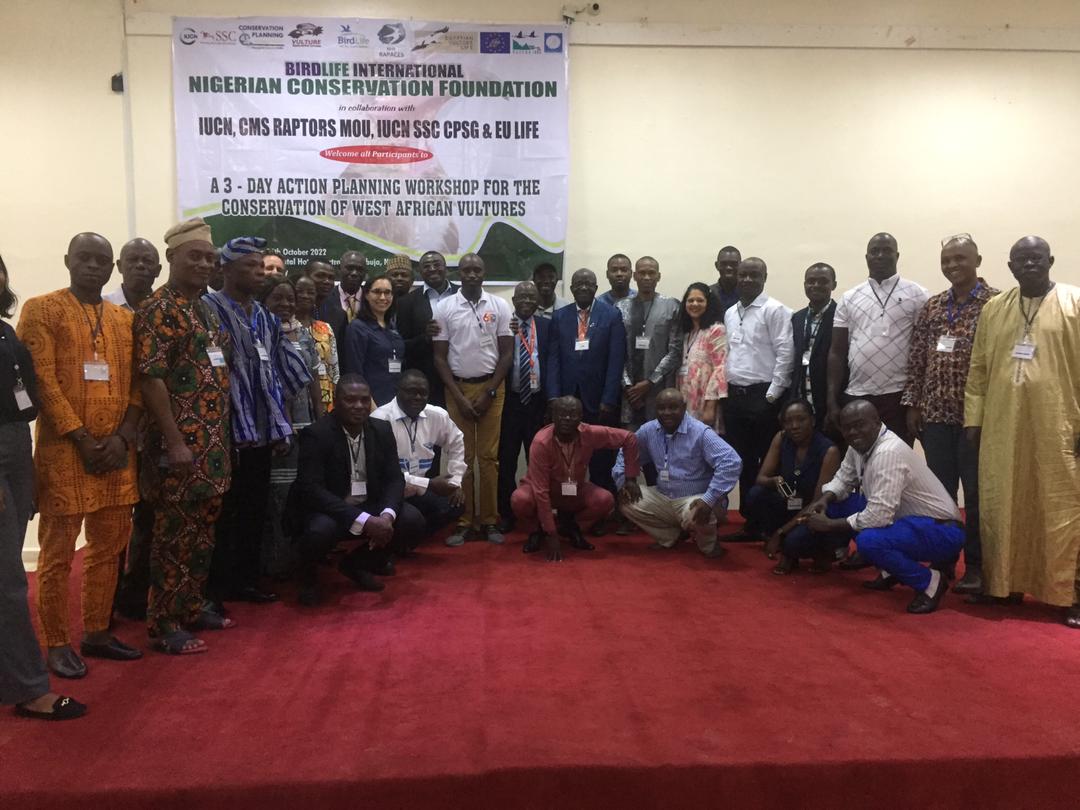The Nigerian Conservation Foundation (NCF) and BirdLife International recently co-organized a sub-regional vulture workshop in Abuja.
The event, held over three days from 12 to 14 October 2022 was facilitated by the IUCN Conservation Planning Specials Group and brought together more than 30 participants from 13 different countries including Convention on Migratory Species (CMS) National Focal Points, Raptors MOU National Contact Points, Convention on International Trade in Endangered Species (CITES) National Authorities, other government representatives, as well as academia and non-governmental organizations, to develop an Action Plan to address key threats to vultures within the subregion – specifically those caused by human activities.
Vultures play a vital role in our environment, keeping it free of decaying carcasses, yet these majestic birds have experienced catastrophic declines, with populations of all African vulture species plummeting by 70-97% over the last 50 years. In West Africa, widespread killing of vultures for belief-based use, where it is erroneously thought that vulture heads and other body parts have special powers and can bring good luck to users, threatens to wipe out stronghold populations of these Critically Endangered birds.
“Nigeria is leading the effort to address the belief-based use by developing and promoting plant-based alternatives to vulture towards engaging vulture users and traders on sustainable practices. The outcome of this workshop will be shared with government and help improve the current process of strengthened wildlife legislation and policy in Nigeria” said Dr. Joseph Onoja – Director General, NCF.
“Given the migratory nature of vultures and the transboundary nature of the threats in West Africa, a coordinated action plan is crucial to address the decline of vultures in the subregion. This workshop gives us hope that we can quickly and urgently implement actions to halt these declines” said Ms. Salisha Chandra, Vulture Conservation Coordinator – Africa, BirdLife International.
During the workshop, participants focussed on four main factors affecting vultures in the sub-region including killing of vultures for belief-based use, trade and use of vultures for belief-based use, cultural perceptions and beliefs around vultures, and indirect persecution.
The inviting character of the discussions facilitated by the IUCN Conservation Planning Specials Group allowed participants to openly contribute what they perceived as realistic solutions. Over the three days participants were able to identify goals, actions, timelines, stakeholders, and indicators relevant to achieving a common vision towards saving these threatened birds.
Further discussions revolved around the development of a governance structure to oversee this Action Plan. Following this workshop, the outcomes of these deliberations will be transformed into a draft action plan which will be reviewed by all meeting participants, before the final document is availed by the end of this year.
“My experience in this sub-regional action plan workshop in the last three days have improved my understanding of the West African challenges peculiar to vultures and the possible solutions that can be prioritized especially in the operationalization of the action plan developed” concluded Mr. Solomon Adefolu, Vulture Project Coordinator at NCF.
The workshop was made possible with collaborative support from EV NewLife partners; Convention on Migratory Species (CMS) and Raptors MOU.








Your article helped me a lot, is there any more related content? Thanks!
Thank you for your sharing. I am worried that I lack creative ideas. It is your article that makes me full of hope. Thank you. But, I have a question, can you help me?
Thank you for your sharing. I am worried that I lack creative ideas. It is your article that makes me full of hope. Thank you. But, I have a question, can you help me?